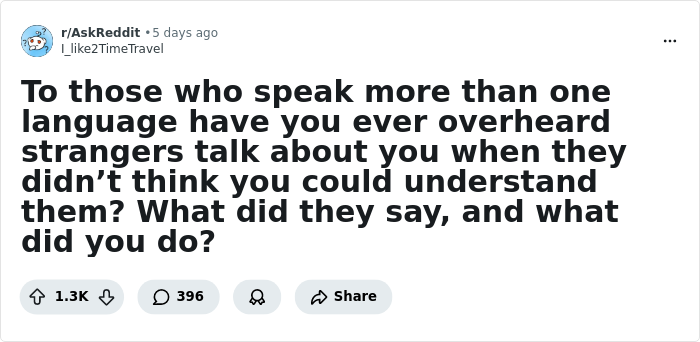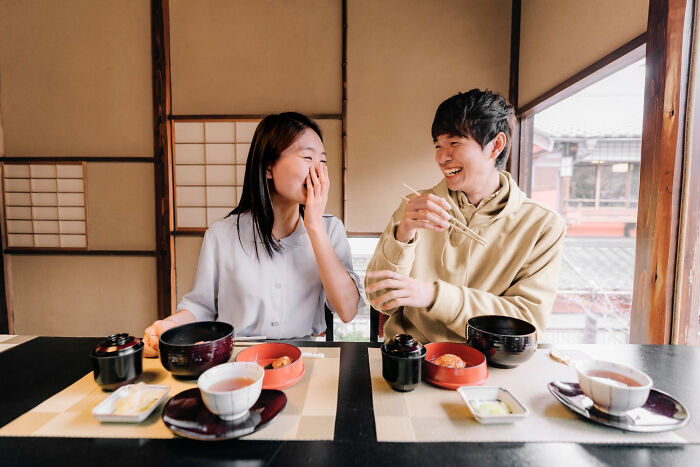Ever walked into a room thinking you’re invisible, only to realize people are talking about you… in a language you don’t understand?
Or so you thought. That sudden shift when comprehension hits — the mix of shock, embarrassment, and sometimes hilarity — is an experience only multilingual people know too well. From tourists in Germany to street vendors in Japan, knowing another language isn’t just useful — it’s a secret superpower. And the best part? It lets you catch gossipers red-handed.

#1 – The Overconfident Student

I was giving a tour of our facility to foreign exchange students. One British student asked highly technical questions — stuff only an engineer or environmental science major would notice. A few other students whispered in Mandarin about how annoying he was. But the English student? He turned around and responded in flawless Mandarin. Later, when they switched to a rarer dialect (Foochow), he still understood and clapped back. The lesson: never assume someone doesn’t understand you.
It was a beautiful reminder that language isn’t just a tool for communication — it’s also a way to gauge subtle social dynamics. What we perceive as harmless whispers can suddenly become very real when someone understands everything.
#2 – Compliments in Disguise

At a farmers market abroad, two women whispered about how beautiful my wife’s eyes were. I understood every word. When I smiled and made eye contact, their embarrassment melted into laughter. My wife loved hearing the story, and I realized that multilingualism sometimes turns casual eavesdropping into shared joy. It’s like having a backstage pass to human interactions — you hear things most people never notice.
#3 – German Praise

Running a jewelry booth at pop-up art shows often means talking to people from all over the world. One day, a German family admired my pieces and complimented them in German. I didn’t intervene — until they left, and I casually said, “Tschüss!” They ran back, laughing, amazed that I understood everything. Moments like this highlight that language is not just for communication but also for connection.
#4 – Diplomatic Languages

Living in DC, you never know who understands what. Once, I saw an older Nigerian gentleman helping tourists who spoke Russian. Later, I learned he’d been a diplomat fluent in their language. The surprise, the gratitude, the connection — all without any prior setup — was priceless. Language can quietly turn strangers into allies and create bridges in moments where no one expects it.
#5 – Zagreb Table Incident
Dining in Zagreb, a woman rudely complained in Croatian about Americans. Thanks to my grandmother, who taught me the language, I replied politely in perfect Croatian.
Her face was priceless — equal parts shock and embarrassment. That day, I realized that multilingualism isn’t just about understanding words; it’s about owning a subtle power in social spaces.

#6 – Hakka Hero

A friend fluent in Hakka overheard two men arguing in NYC Chinatown. Without hesitation, he joined the conversation in Hakka, diffusing tension instantly. Everyone walked away smiling. Multilingualism, in this case, was more than a skill — it was a peacemaking superpower. Language allows us to intervene, resolve conflict, and make human interactions smoother — sometimes without anyone realizing it.
#7 – French Fashionistas
In Dubai, a group of French tourists whispered complaints about me. With a simple sarcastic “désolée,” I acknowledged their words. The surprise on their faces and the blush that followed reminded me how humor and language often travel together. Sometimes, the best reactions are the ones that require no confrontation — just understanding.

#8 – Japanese Chopsticks

A Japanese girl mocked my friend’s chopstick skills. I spoke to her boyfriend in Japanese, letting him clarify the question. The girl wasn’t amused initially, but eventually, understanding and kindness resolved the situation. These small interactions show that fluency in another language isn’t just practical — it also allows subtle, empathetic interventions in delicate social situations.
#9 – Souq Justice

Visiting a Middle Eastern market, a shopkeeper insulted me in Arabic. I responded fluently. Everyone else laughed, the rude vendor softened, and even offered a discount. Multilingualism: 1. Rude vendor: 0. Language doesn’t just enable communication — it can also subtly correct behavior and establish respect.
#10 – Polish Movie Theater

While watching a film in Poland, a group of women discussed my hair in Polish. I turned and addressed them in their own language. They froze. Sometimes, being understood is enough to silence gossip without confrontation. Multilingualism grants a quiet, almost magical control over social interactions.
#11 – French Café

While waitressing for German tourists, a French couple complained about the food in English. I finally responded in French, and their shocked expressions made my day. Language can transform ordinary customer service into a theater of surprise and delight — all because comprehension matters.
#12 – Japanese Hike

While on a Japanese hiking trail, I overheard hikers arguing about the distance. I clarified in Japanese and moved along. Their stunned looks stayed with me long after. These small, everyday encounters remind you that being multilingual is not about grand gestures — it’s about subtly asserting understanding when others assume ignorance.
#13 – Spanish Surprise

Learning Spanish on the job paid off one day when a colleague asked a question in Spanish, thinking I didn’t understand a prior conversation. Her face went pale when I answered fluently. The satisfaction in moments like this isn’t revenge — it’s recognition. Language lets you claim your space quietly, confidently.
#14 – Twi in Ghana

In Ghana, I spoke Twi fluently. A woman in line was caught off guard when I responded to her comment. She apologized profusely. Multilingualism can be a bridge, even in places where you’re a foreigner. It opens doors, earns respect, and sometimes defuses tension instantly.
#15 – Swahili Respect

Kids in East Africa shouted tourist phrases at me, teasing as children do. I replied in Swahili, and suddenly they treated me with proper respect. Language transforms how we’re perceived — even by the youngest observers. It’s a reminder that communication goes far beyond words; it’s about presence and understanding.
#16 – Haggling in Gold
At a precious metals shop, I overheard a family negotiating. Knowing their strategy, I walked away and sold elsewhere. Sometimes multilingualism is not about engaging but observing, learning, and making strategic choices. Understanding the language gives you an invisible advantage.

#17 – Gran in Wales

During WWII, my grandmother, partly raised in Wales, spoke fluent Welsh to locals who insulted her. She silenced them immediately, demonstrating that language can be a shield as well as a sword. Stories like hers remind me that multilingualism is a generational skill, handed down and sharpened over time.
#18 – Spanish Embassy

Fixing a computer at the Mexican embassy, I overheard gossiping women. Speaking Spanish fluently, I responded lightly but confidently — and the horrified expressions were priceless. Language turns mundane work into moments of social influence.
#19 – Flirty Confession

A woman didn’t realize I understood her language. When she did, she blushed — and months later, we became a couple. Multilingualism can even bridge romantic barriers, creating intimacy and shared understanding that goes beyond the obvious.
#20 – Hindi Hustle

While buying a car in Milton Keynes, I overheard the salesman criticizing us in Hindi. I confronted him in his own language. Not only did he apologize, he lowered the price. Language can level the playing field, even in negotiations.
#21 – French on the Bus

On a London bus, a French group criticized the British. I spoke French and warned them that someone might understand. Their embarrassment was satisfying — subtle, elegant, and non-confrontational. Language allows you to intervene in social dynamics without raising your voice.
#22 – Secret Compliments

An office maintenance guy once called me “the pretty one” in Spanish. I let it slide for months — a perk of multilingualism that brings small, private joys unnoticed by others.
#23 – Afrikaans Train

Women criticized my appearance in Afrikaans. I responded before exiting — embarrassed but amused, they laughed afterward. Language can defuse tension, create humor, and establish boundaries simultaneously.
#24 – German Line Cook

While dining in Germany, I overheard diners criticizing my food. Instead of reacting angrily, I offered a polite “Danke” with a smile. Their expressions shifted from smug to slightly humbled, and I walked away quietly victorious. Sometimes, subtlety speaks louder than confrontation.
#25 – Americanized Ethnicity

At a sports bar, a group of girls spoke poorly about me in our shared heritage language, assuming I didn’t understand. As I said goodbye in the same language, they froze mid-sentence. The realization was priceless — a quiet reminder that language can instantly level social hierarchies.
#26 – Brazilian Banter

In Brazil, a few people joked about me in Portuguese. I answered in kind, catching them completely off guard. Laughter followed, turning potential embarrassment into camaraderie. It’s moments like this where language transforms awkwardness into connection.
#27 – Antique Store in Japan

In a Japanese antique store, I asked a price in broken Japanese. The assistant turned to a coworker and laughed, “She can’t afford anything here.” I calmly replied in perfect Japanese, “Actually, I understood that,” and walked out. Their mortification was palpable, and I may have hidden behind the nearest shelf, trying to contain my amusement.
#28 – Airport Security Surprise


At an airport in Morocco, security officers were speaking in Arabic about a suspicious bag, assuming I couldn’t understand. I casually responded in Arabic with the correct identification details, and their surprised smiles instantly dissolved tension. Multilingualism: turning anxiety into smooth efficiency.
#29 – Correcting Teen English
Visiting Germany with my mom, teens mocked my English while trying to show off their own. Their grammar was shaky, so I corrected them… in German. Then added, “I may be American, but at least I speak both languages fluently.” Their reactions? Priceless.
#30 – Kids’ Heritage Debate
Living in China, strangers often commented on whether our kids “looked Chinese.” I replied in Chinese, “Their dad is Chinese,” and they quietly walked away. My ex jokingly suggested claiming they were secret descendants of a Chinese leader — I never had the courage, but the thought still makes me laugh.
#31 – Cheating Revealed
Once, I overheard my boyfriend’s friends discussing his cheating in German. Their faces went pale when I revealed I understood everything. That guy quickly became my ex. Language, in this case, acted as both detective and justice system.
#32 – Plant Critique
While crouched behind my plants in a park, someone muttered in Spanish about why I had so many. I didn’t respond — just smiled. Sometimes, being understood silently is enough to assert presence.

#33 – Bakery Lesson
At a bakery near the border, a coworker complained about my friend using the bathroom. I calmly told her in perfect Spanish that I was a teacher of the language. She was stunned, realizing the tables had turned. Language empowers, even in mundane moments.
#34 – Mexican Restaurant Encounter
An elderly couple in Mexico asked to sit with my brother-in-law and me. They questioned me in Spanish, then fell silent after realizing I spoke it fluently. Their awkwardness contrasted sharply with my smooth navigation of the situation.
#35 – Foreign in China
Walking toward an event in China, kids whispered, “Look, a foreigner.” I replied in Chinese, “I speak a little,” leaving them amazed. Their mother’s equally surprised expression made me grin. Language bridges gaps, even in moments of cultural curiosity.
#36 – Spanish Footstep Comment
My husband stepped on an older man’s foot, and he muttered “Pies de payaso” (“clown feet”). I chuckled and responded politely in Spanish. The tension diffused immediately — humor and fluency are a powerful combination.
#37 – Preteen Spanish Skills
At 13, I overheard grown men making inappropriate comments in Spanish. I was both upset and thrilled — finally, an opportunity to use my language skills to assert myself. Learning a language truly empowers from a young age.
#38 – Italian Argument

In Italy, a couple argued, and the woman made a rude comment. I clapped back sarcastically in Italian with a comment about “performance art.” They walked off fuming, while I quietly enjoyed my linguistic victory.
#39 – Leipzig Monument
While climbing a monument in Leipzig, Germans behind us complained about “fat Americans.” I responded in German, “We’re not all fat!” They laughed, tension eased, and the moment became a shared joke — a reminder that humor and language often travel together.
#40 – Grocery Store Comeback
Checking out at a store, I noticed Hispanic women gossiping in Spanish. I counted my change aloud in Spanish, making my presence known. One returned later, either impressed or mortified — both outcomes were satisfying.
#41 – Train & Coffee Shop

On a French train, I overheard Americans being mocked. I joked in French, earning laughter. Later, in Bucharest, I overheard a woman debating between two men. I understood every word, quietly enjoying the insight. Being multilingual turns ordinary observation into a rich, insider experience.
#42 – Lab & Politics
Lab techs whispered about my appearance; I thanked them in their language. Another assumed I didn’t know local politics — I corrected him gently but firmly. Language allows you to assert competence and confidence without confrontation.
#43 – Convenience Store Advice

A father told his daughter to avoid me in a small convenience store — in a language not spoken locally. I was traveling domestically, so I just smiled. Multilingualism sometimes means hearing things no one expects you to.
#44 – Mountain in Japan
Walking a narrow mountain path in Japan, a German girl complained we were talking too slowly in French. I replied with an enthusiastic “Achsoooo!” (“Oh, I see!”) and smiled. Humor and comprehension together can diffuse awkward tension instantly.
#45 – Farewell at the Station
At a European train station, a group of travelers mocked my accent in several languages, assuming I couldn’t understand. As I boarded the train, I bid each in their own language: “Auf Wiedersehen, au revoir, adiós, ciao!”
Their stunned silence followed by laughter made my departure unforgettable. It was the perfect closing story — multilingualism turned ordinary travel into a small, personal triumph.
Conclusion
Being multilingual isn’t just about communication — it’s a secret edge in everyday life. It allows you to detect dishonesty, navigate cultural nuances, connect across borders, and even defend yourself from gossip or judgment.
Beyond practical advantages, these stories highlight the subtle power and joy of understanding more than one language.
Whether shutting down rude comments, delighting strangers with fluency, or quietly observing the world, being multilingual turns ordinary encounters into moments of triumph. Language isn’t just words; it’s influence, confidence, and sometimes, a little harmless revenge.
